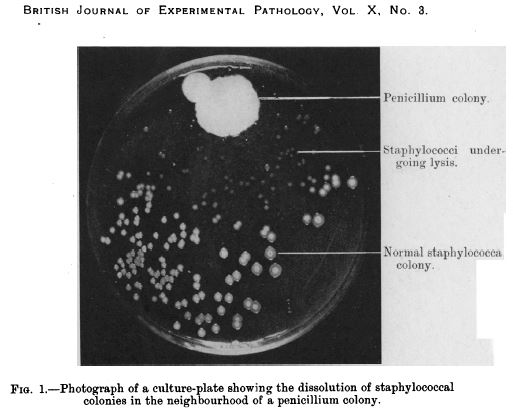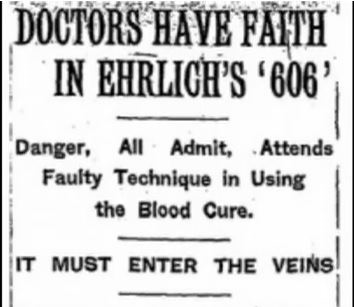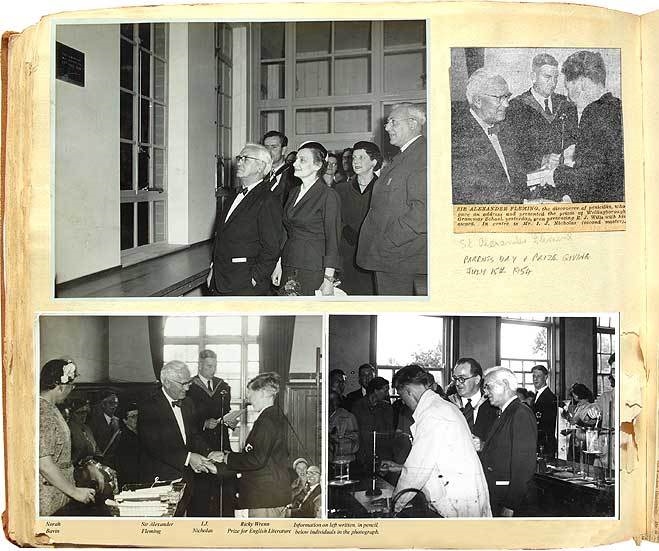The life of Sir Alexander Fleming by André Maurois
Author: P. Pennywagon, Ph.D.Copyright © 2013 Mednansky Institute, Inc.
"It was destiny which led Chain and Florey in 1938 to investigate penicillin instead of the many other antibiotics which had then been described and it was destiny that timed their work to come to fruition in war-time when penicillin was most needed. It may be that while we think we are masters of the situation we are merely pawns being moved about on the board of life by some superior power", from Sir Alexander Fleming's speech at the Nobel Banquet in Stockholm, December 10, 1945
The life of Sir Alexander Fleming, discoverer of penicillin, was written by French author André Maurois (1885-1967). The book was commissioned by Lady Fleming who very much wanted André Maurois to write a life biography of her late husband. Being a doctor and bacteriologist herself, she was able to explain 'very exactly' the nature of the problems André Maurois would have to face. He wrote in the preface: "I should never have been able to collect the necessary evidence and documentary material but for the unwearying and generous help given to me by Lady Fleming. Thanks to her, I was able, on my visits to London, to meet almost all those - scientists, doctors and friends - who had played a part in Fleming's career". Naturally the book was dedicated to Amalia Fleming.
André Maurois was a novelist and biographer, not a scientist. And yet his insight into the discovery of penicillin is far-reaching as he writes: "Fleming had for a long time been hunting for a substance which should be able to kill the pathogenic microbes without damage to the patient's cells. Pure chance deposited this substance on his bench. But, had he not been waiting for fifteen years, he would not have recognized the unknown visitor for what it was".
The 1929 publication by Alexander Fleming, introducing penicillin in its crude state as 'a bactericidal non-toxic substance', was forgotten for about ten years. In 1947, at the Fourth International Congress of Microbiology, Fleming recalled: "I spoke of penicillin in 1936 but I was lacking in eloquence, and nobody took any notice … Here was something of extraordinary importance, which was published in 1929, and demonstrated at the Congress of 1936, but which was neglected by everyone for years … It may be that in this Congress there is something like it. If there is, let us not miss it".

Figure is from the 1929 publication showing the effect of contaminating mold (Penicillium notatum) on a two week old culture plate of staphylococci. The colonies of staphylococci close to the mold became transparent due to cell lysis. In the publication, it is stated: …to avoid the repetition of the rather cumbersome phrase 'mould broth filtrate' the name penicillin will be used.
As André Maurois recalled: "One day," he [Fleming] said, "someone will find a way of isolating the active principle, and of producing it on a large scale. Then we shall see it regularly used against the diseases caused by organisms which, I know, it can destroy" [emphasis added]. It is the lone worker who makes the prediction …
The 'Oxford team' led by Ernst Chain and Howard Florey isolated penicillin and established its curative effect in various infectious diseases. Their publication entitled Penicillin as a chemotherapeutic agent is dated August 24th, 1940. It triggered an intensive search for other antibiotics thereby opening new avenues in the treatment of infectious diseases. Penicillin was used to treat wounded World War II soldiers, as it was effective in preventing infection of the wounds.
In his Nobel Lecture, Alexander Fleming remarkably mentioned the potential danger in using penicillin, "But I would like to sound one note of warning. Penicillin is to all intents and purposes non-poisonous so there is no need to worry about giving an overdose and poisoning the patient. There may be a danger, though, in underdosage. It is not difficult to make microbes resistant to penicillin in the laboratory by exposing them to concentrations not sufficient to kill them, and the same thing has occasionally happened in the body. The time may come when penicillin can be bought by anyone in the shops. Then there is the danger that the ignorant man may easily underdose himself and by exposing his microbes to non-lethal quantities of the drug make them resistant."
André Maurois' biography of Alexander Fleming is worth reading. It is a fine portrait of the taught-to-be-cautious good Scot, and a gentle tribute to the great scientist who made 'a good job of work' in fighting microbial diseases. Chapter 6: The war of 1914-18 is revealing of Fleming's dedication to the wounded soldiers. "…those qualified to judge are of the opinion that he [Fleming] never conceived anything more perfect or more ingenious than those brilliant experiments by which he demonstrated the danger to human tissues of antiseptics when wrongly used", wrote André Maurois in Chapter 6.


Alexander Fleming was among the few doctors in England to make use of the arsenical drug '606' (salvarsan) to treat patients suffering from syphilis. He invented a simple apparatus for the treatment by injection of four patients at once. He was known as 'Private 606'. A cartoon by Donald Gray dated 1910 represents Fleming armed with a syringe containing the 'magic bullet' salvarsan.
Suggested Reading:
Nobel Lecture by Alexander Fleming at Nobelprize.org (the 1945 Nobel Prize in Physiology or Medicine was awarded jointly to Sir Alexander Fleming, Ernst Boris Chain and Sir Howard Walter Florey for the discovery of penicillin and its curative effect in various infectious diseases)
Alexander Fleming's discovery of penicillin was reported in The British Journal of Experimental Pathology, Volume 10, 1929, under the title: On the antibacterial action of cultures of a penicillium, with special reference to their use in the isolation of B. influenzae
The new penicillins by Chain E. B., 1964 (PMID: 14246860)
André Maurois and the United States by L. Clark Keating in The French Review, Volume 27, No2, December 1953
The Doctor's Dilemma by Bernard Shaw, 1906, EBook #5070 at Project Gutenberg
Excerpt from The Life of Sir Alexander Fleming, Chapter 3: "One evening, when Bernard Shaw was drinking tea in the lab., the question arose of whether a new patient should be admitted. Freeman said: 'We've got too many cases on our hands already', and Shaw asked: 'What would happen if more people applied to you for help than you could properly look after?' Wright replied: 'We should have to consider which life was best worth saving. Shaw laid a finger to his nose, and said: Ha! I smell drama! … I get a whiff of a play!"

On July 15, 1954, Sir Alexander Fleming presented the prizes at Wellingborough Grammar School and declared the new Fleming Laboratory open. "In his address, he gave this advice to those seeking success: First of all there is work and more work – intelligent work and knowledge sufficient to see where the work leads. Then there is fortune which may play a major part. But he warned: It is no good just waiting for fortune to smile on you. You must be prepared with sufficient knowledge and experience to take advantage of the good things which fortune puts on your plate. And to be successful, Sir Alexander said, it was not only necessary to work hard. Interest in the work was required. It was essential to know what you were doing and why you were doing it. Fortune plays a large part in the lives of all successful men, he said… He told the school, You are doing some of the hard rowing, May you all later experience the favouring breeze". Excerpt is from Memories of Wellingborough Grammar School (2006) by David and Graham Tall. Picture use with permission from Graham Tall.
"The oars rise and fall, beating the water in perfect order and with great power, the lateen sail swells with the favouring breeze, and the long, slender galley darts down the wind…", from John Finnemore's The Barbary Rovers, Chapter I, 1912
Suggested Performance:
Symphony No. 3 in A Minor, Op. 56, 'Scottish' by Felix Mendelssohn, Minneapolis Symphony Orchestra conducted by Dimitri Mitropoulos
Minst.org Online Library Index